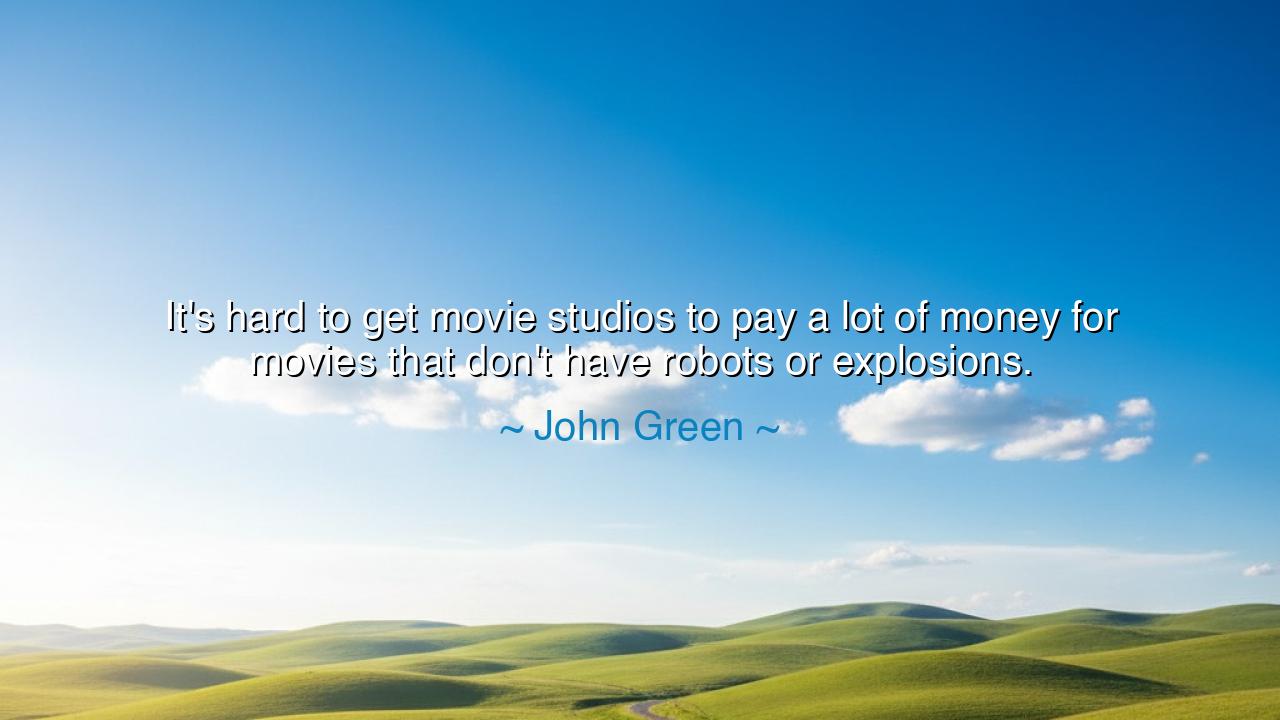
It's hard to get movie studios to pay a lot of money for movies
It's hard to get movie studios to pay a lot of money for movies that don't have robots or explosions.






Hear now, O seekers of wisdom, the words of John Green, who lamented: “It’s hard to get movie studios to pay a lot of money for movies that don’t have robots or explosions.” Though spoken with humor, his saying is not without sorrow, for it reveals a truth about the desires of our age: that the guardians of treasure often prefer spectacle to substance, and thunder to thought. In his voice we hear the cry of the storyteller who longs to speak of the human heart, yet finds the world too distracted by flashing lights and shattering steel.
The meaning is this: in the marketplace of cinema, the merchants of film invest richly in what dazzles—the robots, the explosions, the visions of power and destruction that stir the senses. Yet when a tale comes bearing gentler gifts—a story of love, of loss, of the quiet heroism of the human spirit—those same merchants often turn away, for such stories do not promise mountains of gold. Thus, John Green reminds us that art wrestles ever with commerce, and that truth is not always what the powerful choose to reward.
This struggle is as old as art itself. Recall the age of Rome, when the crowds clamored for gladiators, for blood and spectacle in the great arenas. The poets and philosophers, though wise and noble, were drowned out by the roar of the masses demanding entertainment. Bread and circuses, they called it—feed the people’s hunger for noise, and they will not ask for wisdom. Yet still, the voices of the thinkers endured. Seneca and Marcus Aurelius did not wield swords, yet their words outlasted empires. So too may stories without spectacle endure beyond the fireworks of cinema.
Consider also the tale of Frank Capra, the director who brought forth It’s a Wonderful Life. At first, the film was no triumph in wealth; it faltered at the box office, for it had no grand battles, no fire in the sky. Yet it told of a man’s worth, of community, of sacrifice, and of love. Over time, it grew into one of the most cherished films in history, shining brighter than many spectacles that once eclipsed it. Here lies the truth: while the world may chase explosions, the soul remembers tenderness.
When Green speaks, it is not to condemn the spectacle, but to remind us of balance. For surely there is joy in adventure, in the thrill of battles between machines and heroes. But if all our stories are filled with only noise and fire, then we forget the quieter truths of life: the sorrow of saying goodbye, the triumph of forgiveness, the courage of the unseen. To give all the coin to spectacle is to silence the very stories that remind us who we are.
Let the lesson be this: value the stories of the heart, even when the world does not. Seek out films and books that speak truth to your spirit, even if they do not thunder across screens with sound and fury. Support the creators who dare to tell quieter tales, who risk much to speak of human fragility, joy, and sorrow. In your own life, do not live only for spectacle. It is easy to fill your days with noise and distraction, but the true growth of the soul comes in silence, in reflection, in honest connection with others.
Therefore, O listener, be wise: when the world clamors for explosions, remember the whisper. When the crowd demands robots, remember the human heart. Invest your attention not only in what dazzles the eyes, but in what nourishes the soul. For in the end, the fireworks fade, the machines rust, but the story of love, sacrifice, and humanity endures forever, carved into the memory of generations. This is the ancient wisdom hidden within John Green’s lament: that while spectacle may rule the moment, truth rules eternity.






AAdministratorAdministrator
Welcome, honored guests. Please leave a comment, we will respond soon